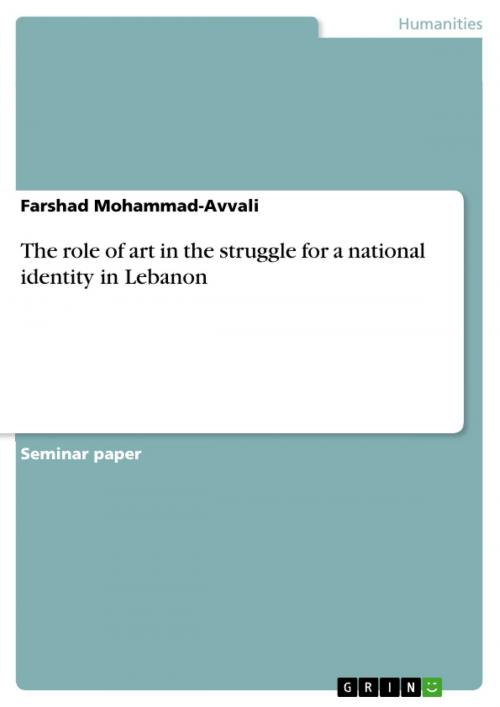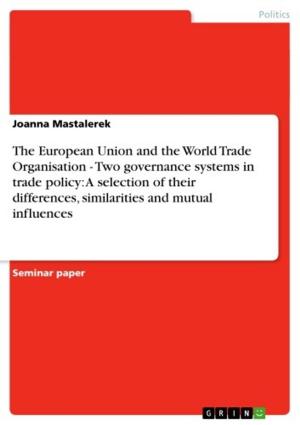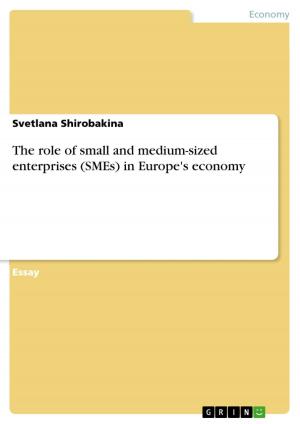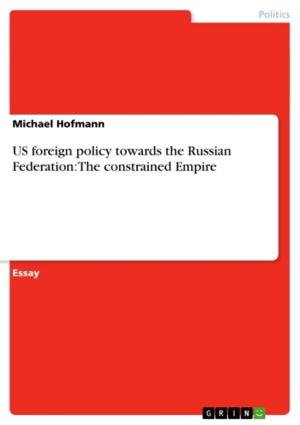The role of art in the struggle for a national identity in Lebanon
Nonfiction, Social & Cultural Studies, Social Science, Anthropology| Author: | Farshad Mohammad-Avvali | ISBN: | 9783638535205 |
| Publisher: | GRIN Publishing | Publication: | August 17, 2006 |
| Imprint: | GRIN Publishing | Language: | English |
| Author: | Farshad Mohammad-Avvali |
| ISBN: | 9783638535205 |
| Publisher: | GRIN Publishing |
| Publication: | August 17, 2006 |
| Imprint: | GRIN Publishing |
| Language: | English |
Seminar paper from the year 2005 in the subject Ethnology / Cultural Anthropology, grade: keine, American University of Beirut, course: Cultural Boundaries and Identities, 10 entries in the bibliography, language: English, abstract: The paper will analyze the nationalist movements and national sentiments of four entities: Quebec, Lebanon, Israel and Greece, and attempt a comparison with the conditions for a vital national identity in Lebanon. It will be suggested that the internal differences in Lebanon, dominated by a very intolerant ethnic marker, namely religion, are so predominant that they overshadow any kind of national identity that can detach Lebanese society from their sub-national attachments in order to generate national sentiments for all Lebanese people. Complicating this condition, also foreign intervention through alliances with the various groups within Lebanon comes into play. Using the Québécois, the Israeli and the Greek example, it shall be shown that a certain amount of internal unity is needed to create sentiments of belonging. Only then, art can play a significant role in enhancing national identity through symbols and material objects. Québec developed a strong legal code to protect its distinct Québécois nature against English-speaking Canada. In Greece, the Orthodox Church took the responsibility of safeguarding not only religion, but also language, folklore, dance and literature against Turkish domination and the post-Ottoman conflict over territory. Israel had and still has to struggle with the construction of a national identity that is based on the ethnic marker religion. Furthermore, the political state had to embrace various Jewish communities with different cultural habits and customs and define what kind of Jewish life is truly acceptable. Hence, cultural customs have been defined in order to create a distinct Israeli identity. For our purposes, we refer to the Arab-Israeli conflict from the Israeli perspective, being fully aware that we only spotlight one certain aspect of it . The paper is based and inspired by Richard Handler's analysis of the Québécois claims for a distinct national character in contrast to the rest of Canada and the independence movement, proclaimed by a considerably high percentage of the population .
Seminar paper from the year 2005 in the subject Ethnology / Cultural Anthropology, grade: keine, American University of Beirut, course: Cultural Boundaries and Identities, 10 entries in the bibliography, language: English, abstract: The paper will analyze the nationalist movements and national sentiments of four entities: Quebec, Lebanon, Israel and Greece, and attempt a comparison with the conditions for a vital national identity in Lebanon. It will be suggested that the internal differences in Lebanon, dominated by a very intolerant ethnic marker, namely religion, are so predominant that they overshadow any kind of national identity that can detach Lebanese society from their sub-national attachments in order to generate national sentiments for all Lebanese people. Complicating this condition, also foreign intervention through alliances with the various groups within Lebanon comes into play. Using the Québécois, the Israeli and the Greek example, it shall be shown that a certain amount of internal unity is needed to create sentiments of belonging. Only then, art can play a significant role in enhancing national identity through symbols and material objects. Québec developed a strong legal code to protect its distinct Québécois nature against English-speaking Canada. In Greece, the Orthodox Church took the responsibility of safeguarding not only religion, but also language, folklore, dance and literature against Turkish domination and the post-Ottoman conflict over territory. Israel had and still has to struggle with the construction of a national identity that is based on the ethnic marker religion. Furthermore, the political state had to embrace various Jewish communities with different cultural habits and customs and define what kind of Jewish life is truly acceptable. Hence, cultural customs have been defined in order to create a distinct Israeli identity. For our purposes, we refer to the Arab-Israeli conflict from the Israeli perspective, being fully aware that we only spotlight one certain aspect of it . The paper is based and inspired by Richard Handler's analysis of the Québécois claims for a distinct national character in contrast to the rest of Canada and the independence movement, proclaimed by a considerably high percentage of the population .















